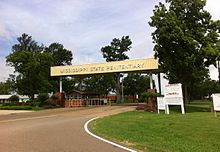

A prison farm (also known as a penal farm) is a large correctional facility where penal labor convicts are forced to work—legally or illegally—on a farm (in the wide sense of a productive unit), usually for manual labor, largely in the open air, such as in agriculture, logging, quarrying, and mining. In the United States, such forced labor is made legal by the thirteenth amendment to the Constitution; however, some other parts of the world have made penal labor illegal. The concepts of prison farm and labor camp overlap, with the idea that the prisoners are forced to work. The historical equivalent on a very large scale was called a penal colony.
The agricultural goods produced by prison farms are generally used primarily to feed the prisoners themselves and other wards of the state (residents of orphanages, asylums, etc.), and secondarily, to be sold for whatever profit the state may be able to obtain.[1]
In addition to being forced to labor directly for the government on a prison farm or in a penal colony, inmates may be forced to do farm work for private enterprises by being farmed out through the practice of convict leasing to work on private agricultural lands or related industries (fishing, lumbering, etc.). The party purchasing their labor from the government generally does so at a steep discount from the cost of free labor.[2]

Louisiana State Penitentiary is the largest prison farm covering 18,000 acres (7,300 hectares); it is bordered on three sides by the Mississippi River.[3] Canada has six large prison farms, which were closed in 2010. Beginning in 2019, two of the farms were gradually reopened.[4]
- ^ Lunau, Kate. "Canada to shut down all prison farms". Maclean's, April 13, 2009.
- ^ "D.A. McCall, Secretary of the Mississippi Baptist Convention Board, Baptizes Convicts on a Prison Farm near Parchman on 18 August 1946". Crime and Punishment: Essential Primary Sources, 2006.
- ^ Glenday, Craig (2013). 2014 Guinness World Records Limited. Guinness World Records Limited. p. 132. ISBN 978-1-908843-15-9.
- ^ Pfeffer, Amanda (2019-08-15). "Ontario prison farms making a comeback". CBC. Retrieved 2023-12-05.
© MMXXIII Rich X Search. We shall prevail. All rights reserved. Rich X Search
